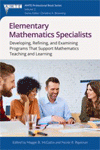
Elementary Mathematics Specialists
Developing, Refining, and Examining Programs That Support Mathematics Teaching and Learning
Edited by:
Maggie B. McGatha, University of Louisville
Nicole R. Rigelman, Portland State University
A volume in the series: The Association of Mathematics Teacher Educators (AMTE) Professional Book Series. Editor(s): Babette M. Benken, California State University, Long Beach.
Published 2017
Elementary mathematics specialists are teacher leaders who are responsible for supporting effective PK–6 mathematics instruction and student learning. The Association of Mathematics Teacher Educators (AMTE), the Association of State Supervisors of Mathematics, the National Council of Supervisors of Mathematics, and the National Council of Teachers of Mathematics, in a 2010 joint position paper on Elementary Mathematics Specialists (EMSs), all advocate for the use of EMSs to support the teaching and learning of mathematics. The specific roles and expectations of EMSs will vary according to the needs of each setting, “but their expertise and successful experience at the elementary level is critical” (p 1).
Elementary Mathematics Specialists: Developing, Refining, and Examining Programs that Support Mathematics Teaching and Learning is AMTE’s latest resource supporting the important work of EMSs. It has five sections related to the preparation and professional development of EMSs: (a) Overview and Current State of Affairs; (b) Models of EMS Program Development & Delivery; (c) Supporting EMSs in the Field; (d) The Mathematics Specialist Research; and (e) Future Directions. The book provides support to EMS practitioners, program providers/developers, and researchers seeking to answer important questions about how to prepare Mathematics Specialists, support them in the field, and research their effectiveness.
CONTENTS
Foreword. Introduction, Maggie B. McGatha and Nicole R. Rigelman. SECTION A: BACKGROUND. We Need Elementary Mathematics Specialists Now: A Historical Perspective and Next Steps, Francis (Skip) Fennell. Preparing Elementary Mathematics Specialists: Essential Knowledge, Skills, and Experiences, Zandra de Araujo, Corey Webel, and Barbara Reys. Current State of Mathematics Specialist State Certification and Standards, Nicole R. Rigelman and Jonathan A. Wray. SECTION B: MODELS FOR MATHEMATICS SPECIALIST PROGRAM DEVELOPMENT AND DELIVERY. Models for Mathematics Specialist Program Development and Delivery, Denise A. Spangler and Robyn L. B. Ovrick. Specialized Program Development: The California Elementary Mathematics Specialist Story, Nadine S. Bezuk and Joanne Rossi Becker. A Collaborative Model: From Establishing Certification to Developing and Delivering a Program, Terry Goodman, Ann McCoy, and Larry Campbell. A Blended Online Model for Instruction: The North Carolina Story, Catherine S. Schwartz, Shelby P. Morge, Sidney L. Rachlin, and Tracy Y. Hargrove. The Transforming East Alabama Mathematics Teacher Leader Academies, Marilyn E. Strutchens and Gary Martin. Creating a Viable Elementary Mathematics Specialist Program, Nicole R. Rigelman. A Case for Secondary Mathematics Coaches, Jonathan A. Wray and William J. Barnes. SECTION C: ONGOING LEARNING AND SUPPORT OF MATHEMATICS SPECIALISTS. Supporting Elementary Mathematics Specialists, Patti Brosnan. Elementary Mathematics Specialists and Teacher Leaders Project, Francis (Skip) Fennell, Beth Kobett, and Jonathan A. Wray. A Laboratory Approach to the Professional Development of Elementary Mathematics Specialists, Meghan Shaughnessy, Deborah Loewenberg Ball, and Nicole Garcia. Supporting Elementary Mathematics Specialists Alongside Improving Preservice Programs, Nicole R. Rigelman. The Role of Professional Organizations: Advocacy, Development, and Research, Fran Arbaugh, Valerie L. Mills, and Diane J. Briars. SECTION D: RESEARCHING THE IMPACT OF EMS PROFESSIONALS AND PROGRAMS. Mathematics Specialists: What Does the Research Say? Maggie B. McGatha, Ryan Davis, and Amy Stokes-Levine. Examining Mathematics Coaching Practices that Help Develop Schoolwide Professional Learning, Lynsey Gibbons. Knowledge for Coaching, Elizabeth A. Burroughs, David A. Yopp, John T. Sutton, and Mark Greenwood. A Critical Analysis of Emerging High-Leverage Practices for Mathematics Coaches, Courtney K. Baker, Pamela Bailey, Shannon M. Larsen, and Terrie M. Galanti. Factors Influencing Elementary Mathematics Specialists’ Impact on Student Achievement, Patricia F. Campbell, Matthew J. Griffin, and Nathaniel N. Malkus. Elementary Mathematics Specialists as Elementary Mathematics Teachers, Kimberly A. Markworth. Evaluation of Elementary Mathematics Specialist Programs, Nicole R. Rigelman. SECTION E: WHAT’S NEXT FOR THE FIELD? Elementary Mathematics Specialist Preparation: What’s Next? What’s Needed? Barbara J. Reys, Corey Webel, and Zandra de Araujo. About the Editors.
-
Paperback9781681238227
Web price: $45.04 (Reg. 52.99)
-
Hardcover9781681238234
Web price: $80.74 (Reg. 94.99)
- eBook9781681238241

- EDU010000 - EDUCATION: Elementary
- EDU029010 - EDUCATION: TEACHING METHODS & MATERIALS: Mathematics
- EDU037000 - EDUCATION: Research
-
 (Re)Envisioning Social Studies Education Research
Current Epistemological and Methodological Expansions, Deconstructions, and Creations
(Re)Envisioning Social Studies Education Research
Current Epistemological and Methodological Expansions, Deconstructions, and Creations
-
 A Practical Guide to Exemplary Professional Development Schools
A Practical Guide to Exemplary Professional Development Schools
-
 Building Support for Scholarly Practices in Mathematics Methods
Building Support for Scholarly Practices in Mathematics Methods
-
 Cases for Mathematics Teacher Educators
Facilitating Conversations about Inequities in Mathematics Classrooms
Cases for Mathematics Teacher Educators
Facilitating Conversations about Inequities in Mathematics Classrooms
-
 The AMTE Handbook of Mathematics Teacher Education
Reflection on Past, Present and Future – Paving the Way for the Future of Mathematics Teacher Education, Volume 5
The AMTE Handbook of Mathematics Teacher Education
Reflection on Past, Present and Future – Paving the Way for the Future of Mathematics Teacher Education, Volume 5
-
 The Mathematics Teacher Education Partnership
The Power of a Networked Improvement Community to Transform Secondary Mathematics Teacher Preparation
The Mathematics Teacher Education Partnership
The Power of a Networked Improvement Community to Transform Secondary Mathematics Teacher Preparation
-
 The Undivided Life
Faculty of Color Bringing Our Whole Selves to the Academy
The Undivided Life
Faculty of Color Bringing Our Whole Selves to the Academy

